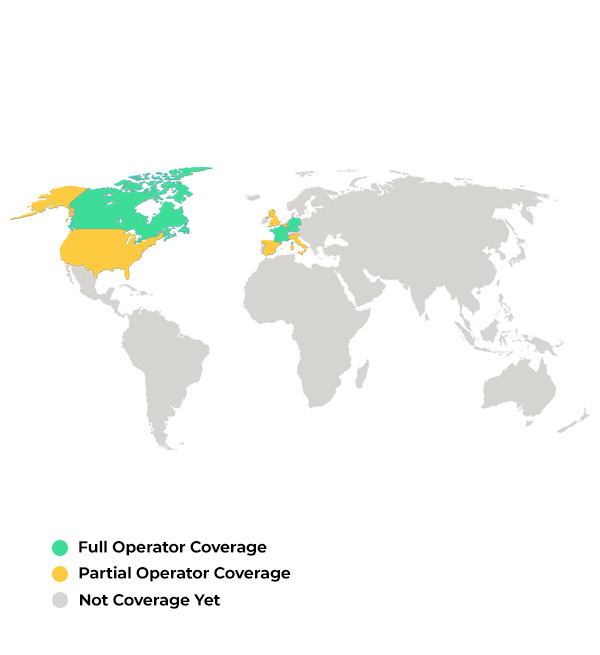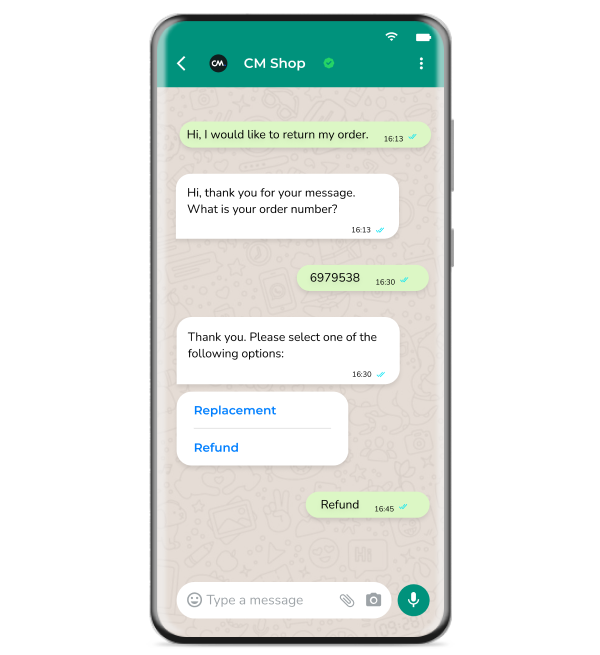- RCS Business Messaging
- WhatsApp Business Messaging
- Channel awareness
- RCS vs WhatsApp: comparing the channels
- Should you adopt WhatsApp or RCS for business messaging?
Both WhatsApp and RCS are similar in what they have to offer: conversational messaging rich in media and features. Similar, but not identical of course. Before we dive into comparing both channels, let's highlight the basics.
RCS Business Messaging
Rich Communications Services (RCS) is an upcoming messaging protocol. It was originally created to replace SMS and MMS messaging and to elevate text messaging to modern messaging standards. RCS offers many of the features available on popular messaging platforms such as WhatsApp, Facebook Messenger and iMessage. As a bonus perk, it enables users to communicate with businesses within the native messaging of their phones similar to SMS - without the need to download an additional app.
Does this mean that RCS also benefits from the same global reach as its predecessor SMS? Well, operators need to enable RCS messaging in relevant regions, but it is not yet as globally supported as SMS. Apple did announce that they'll add RCS support to iOS 18 and up, which is great news for the channel's popularity.
According to Statista, more than half of the smartphone users worldwide own Android-operated phones, but iOS is on the rise among the younger generations. Around 35% of Millennials owned an iPhone in 2023, followed closely by 31% of Generation Z. RCS becoming available to this group of people will significantly increase its global reach.
WhatsApp Business Messaging
Introducing WhatsApp almost feels superfluous. With approximately two billion monthly active users worldwide, most are probably already familiar with the app. The channel outranks both WeChat (1.3 billion) and Facebook Messenger (930 million) in terms of global users, and it's the third most popular social network worldwide, following Facebook and YouTube.
WhatsApp offers its users an alternative to SMS, reliant on internet access and with a ton of rich media features like media sharing, gifs, emojis, and group chats to elevate the conversations. It's available in all app stores and on most - if not all - operating systems. Meta (the developers behind WhatsApp) released the WhatsApp Business Platform as a tool for businesses to harness the power of this channel for business communication.
Channel awareness
It is important to note that WhatsApp as a channel is much more widely known amongst consumers than RCS. Most people use, or have at least heard of WhatsApp, and are familiar with both the channel and its possibilities.
RCS however, is a less known name. Funny enough, most people have probably used RCS before, without realising it. Newer Android phones have RCS automatically enabled, but because the messages arrive in the same inbox as SMS and MMS, consumers might not even notice they are actually sending and receiving RCS messages. This means that from a consumer perspective, the name 'WhatsApp' will probably ring a bell for most, while the name RCS may be relatively unknown. RCS however, might be more intuitive to use. Using it from the native messaging app is a low threshold for consumers to use RCS - even if they may incorrectly call them SMS messages.
RCS vs WhatsApp: comparing the channels
Now that both channels have been introduced, we'll dive into comparing them on five key factors: features, reach, security, automation and costs.
1. Features
Both WhatsApp and RCS offer rich user experiences. Especially from a consumer perspective, the channel features overlap quite a lot: sending and receiving images and videos, read receipts, group chats, gifs, emojis and even 'user is typing' notifications are available for both WhatsApp and RCS.
For business messaging, they also have some overlapping features like checkmarks for verified senders, carousels and suggested answers or interactive buttons. WhatsApp however, has a longer history in business messaging, and that shows.
Besides its verified green tick and interactive buttons, the WhatsApp Business Platform offers more features tailored to specific business messaging use cases like marketing, service, utility and authentication. Features such as WhatsApp Message Templates, carousels, product messages, newsletters, WhatsApp Flows, WhatsApp Business Search and click-to-chat WhatsApp ads.
Most of these features are also available, or at least possible, on RCS. The platform however is less mature, so it may feel a little less intuitive than using the WhatsApp tools.
Though both channels offer a similar rich user experience, WhatsApp Business Platform tailored its tools to business messaging use cases. This makes it easier and more intuitive for businesses to use these messaging tools.
2. Reach
Globally speaking, WhatsApp is one of the most popular messaging channels. It has two billion monthly active users worldwide sending 100 billion messages each day. Does that mean that WhatsApp has the biggest reach of all messaging platforms? Well, not necessarily.
While WhatsApp is available everywhere, its popularity can dwindle in certain areas. It's immensely popular in most parts of Europe, Brazil, Mexico and India. In large parts of Asia however, WhatsApp has to compete with local favourites such as WeChat and Line. In the USA WhatsApp also has serious competition from its Meta brothers Facebook Messenger and Instagram Messaging.
CM.com covers WhatsApp worldwide, but WhatsApp does require that consumers download the app and register it on their phones - which can be a barrier to adoption. RCS on the other hand, can be used on all Android devices without additional downloads. And now that Apple announced that they will release RCS support with iOS 18, the reach of the channel will only increase.
RCS has around 1 billion active monthly users and CM.com has full RCS coverage in Canada, France, and Germany. With partial operator coverage in Italy, the Netherlands, Spain, the UK and the US.
 So, which one of the two has the better reach? Well, that depends on your target group. Where is your audience located? And what channels do they prefer? This all plays a large role in choosing the right communication channels, regardless of which channel is bigger in numbers worldwide. Are your customers located in India, where during the second quarter of 2022, almost six million WhatsApp downloads were registered? Then WhatsApp Business will probably be a good fit. But does your audience live in Japan? Then WhatsApp Business probably wouldn't even scratch the surface of your target group.
So, which one of the two has the better reach? Well, that depends on your target group. Where is your audience located? And what channels do they prefer? This all plays a large role in choosing the right communication channels, regardless of which channel is bigger in numbers worldwide. Are your customers located in India, where during the second quarter of 2022, almost six million WhatsApp downloads were registered? Then WhatsApp Business will probably be a good fit. But does your audience live in Japan? Then WhatsApp Business probably wouldn't even scratch the surface of your target group.
Choose a communication channel based on your target group's needs and wants. Both WhatsApp Business and RCS have a strong global presence, but what matters in the end is which channel will reach your audience in the right amount of time and get them to engage.
3. Security
In 2022, three in four organisations reported having experienced smishing attacks. Fraudsters will impersonate trusted companies to scam loyal customers out of credentials, personal information and even bank details. Fortunately, the danger of cybercrime is becoming common knowledge for consumers. Everybody has been told at least once to never click suspicious links or open messages from unknown senders. This however creates a distrust towards all messages they receive - even branded content.
Both RCS and WhatsApp Business offer verified business profiles to combat this fraud and gain customer trust. The verified sender profiles of RCS and the WhatsApp green tick both signal to customers that the accounts they are talking to are legit - building trust and paving the way for more meaningful conversations. The channels differ in their approach to verified business profiles. Want to send RCS messages as a business? Then a verified sender profile is required. WhatsApp allows businesses to use their platform without verification, but businesses can apply for the green tick if they want to increase customer trust. Unverified business profiles do have a daily limit to the amount of messages that can be sent. Once verified, this limit is gone. Verified business profiles add an additional layer of security and trust to sending out One Time Passwords (OTPs).
WhatsApp messages are also end-to-end encrypted, reducing the risk of fraud even further. RCS A2P messages are not encrypted. Is that bad? Well, what RCS may lack in encryption, it can make up for in reach - depending on your audience. One of the key factors of a successful security strategy is the adoption of it by your customers. You can offer the most secure and high-level end-to-end encrypted solutions to your customers, but if those measures are too much trouble for them to adopt, they won't do it. Convenience is the best step to security.
WhatsApp and RCS both offer verified business profiles to combat fraud and increase customer trust. RCS requires a verified sender profile, for WhatsApp Business it's an added bonus. Both channels are suitable for sending out OTPs, but where WhatsApp Business is end-to-end encrypted, RCS is not.
4. Automation
An important aspect of A2P business messaging is automation. Online audiences can be large and to make sure you'll give every customer the personal experience they crave, automation is needed.
WhatsApp Business Platform allows businesses to deploy a WhatsApp Chatbot, either as a first-line agent to customers' questions and requests or to handle more complex automation processes. These so-called WhatsApp bots are increasingly popular. In 2022, research found that around 60 percent of companies surveyed stated that they have predominantly developed chatbots for WhatsApp (Statista).
RCS also support the use of chatbots, and though RCS bots are less known and less explored, the capabilities they offer are almost identical to WhatsApp bots.

Both our chatbots, available via our Engagement Platform, can be easily deployed on WhatsApp Business Platform and RCS, ready to serve your customers.
5. Costs
Costs always vary depending on location, provider, etc. WhatsApp Business Platform pricing is conversation-based and the conversation-type influences the price you pay. User-initiated conversations are generally cheaper, and WhatsApp Business also sweetens the deal with 2-hour free-of-charge service entry points from other Meta channels like Facebook and Instagram, and 1000 free service conversation per month. Great news if you want to use WhatsApp Business as a customer service channel.
RCS pricing depends on the type of RCS message you want to send. RCS Basic Messages are priced similar to SMS messages, but also have the same limitations as SMS. Want to send rich RCS messages? Then the pricing is split between single messages (business-initiated) and conversations (when a customer reacts to a business-initiated message, the next 24h will be considered a conversation). So RCS pricing is both usage and conversation-based, but contrary to WhatsApp, RCS doesn't differentiate between different conversation types. All conversations are billed the same.
WhatsApp Business Platform pricing is priced per conversation, charging different fees for different conversation-types. The WhatsApp Business Platform is thus priced on the value of the conversations. RCS pricing is based on usage and conversations. What would be the most cost-effective option for your business highly depends on your location, provider, but also on your use case.
Should you adopt WhatsApp or RCS for business messaging?
The WhatsApp Business Platform and RCS Messaging are quite similar in the features and possibilities they offer to businesses worldwide. WhatsApp Business enjoys seniority in some aspects, but RCS technology is advancing fast. And a similar thing can be said for the coverage and reach of both channels.
So how does one choose a channel? It is important to pick channels based on the customers you wish to reach and with what use case. Base your choice on the location of your customers, their preferred communication channels, their needs and wants. Tailoring your communication strategy to your audience will result in happy customers - and happy customers will lead to happy businesses.
And remember: sometimes it's not even a choice. Both communication channels can serve different use cases or regions, and can easily work side-by-side to provide an omnichannel experience.
